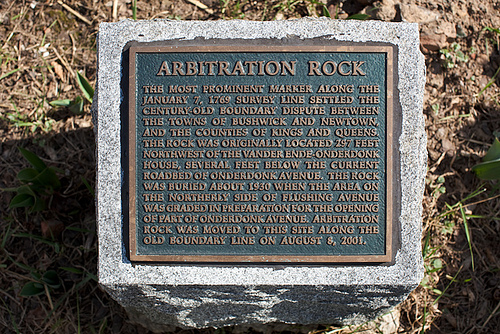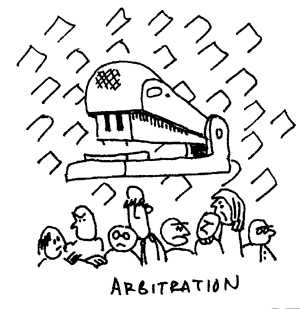Contracts related to real estate transactions often have arbitration provisions included, requiring the parties to submit their disputes to an arbitrator rather than the court. Some standard forms, such as the CAR forms, have optional arbitration provisions that apply if accepted by all parties. Commercial Brokerages often require binding arbitration in the representation agreements. The argument for arbitration is that it is faster and cheaper. This may be true in low-dollar transactions, but otherwise, I believe it is a myth. Also, arbitrator decisions are not appealable, even if erroneous. I’ve written before about alternatives to arbitration, namely judicial reference and general reference, which allow hearings by a referee and oversight by the court. However, in a recent decision, a contract required binding arbitration under AAA rules (with a panel of 3 arbitrators) and the large brokerage was well on its way to bankrupting the plaintiff due to the cost of the proceeding. The court rescued the plaintiff, finding that if they could not afford the arbitration, the matter could be heard by the court.
 In Weiler v. Marcus & Millichap Real Estate Investment Services Inc., the plaintiffs hired Marcus & Millichap to advise them regarding a 1031 exchange of their Las Vegas Properties for a commercial property in Texas with a Red Robin restaurant, supposedly worth $4.1 million. They claim that M&M represented that this was a solid income producing property, and that the tenant was required to pay the property taxes. Shortly after the deal closed the tenant became delinquent in rent and property taxes. The plaintiffs lost money and eventually sold the property for $2.1 million less than they had paid.
In Weiler v. Marcus & Millichap Real Estate Investment Services Inc., the plaintiffs hired Marcus & Millichap to advise them regarding a 1031 exchange of their Las Vegas Properties for a commercial property in Texas with a Red Robin restaurant, supposedly worth $4.1 million. They claim that M&M represented that this was a solid income producing property, and that the tenant was required to pay the property taxes. Shortly after the deal closed the tenant became delinquent in rent and property taxes. The plaintiffs lost money and eventually sold the property for $2.1 million less than they had paid.
The plaintiffs filed suit, but their contract with M&M required binding arbitration through the American Arbitration Association (AAA). M&M had the court order the case to arbitration. The court retained jurisdiction for monitoring the arbitration.
 California Real Estate Lawyers Blog
California Real Estate Lawyers Blog


 In
In  In a recent decision the court enforced a general reference provision that did not include an explicit waiver of a jury trial. In
In a recent decision the court enforced a general reference provision that did not include an explicit waiver of a jury trial. In In
In  Questions of conflicting rulings are occasionally seen by
Questions of conflicting rulings are occasionally seen by  In
In  The purchase contract required arbitration, so the court ordered the case to arbitration. The arbitration resulted in an arbitration award of more than $1.6 million to the plaintiff. The arbitration award, however, was not against the trustees, but against the trust itself, and the partnership. The arbitrator found that the trustees “are not personally liable for their acts as trustees.” Anyone in such a situation should consult an experienced
The purchase contract required arbitration, so the court ordered the case to arbitration. The arbitration resulted in an arbitration award of more than $1.6 million to the plaintiff. The arbitration award, however, was not against the trustees, but against the trust itself, and the partnership. The arbitrator found that the trustees “are not personally liable for their acts as trustees.” Anyone in such a situation should consult an experienced